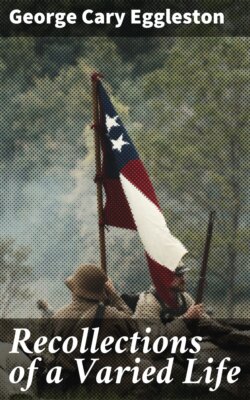Читать книгу Recollections of a Varied Life - George Cary Eggleston - Страница 6
На сайте Литреса книга снята с продажи.
IV
ОглавлениеTable of Contents
The Composite West
I think, however, that the West was less provincial, probably, and less narrow in its views and sympathies than were New England, the Middle States, and the South at that time, and this for a very sufficient reason.
The people in New England rarely came into contact with those of the Middle and Southern States, and never with those of the West. The people of the Middle States and those of the South were similarly shut within themselves, having scarcely more than an imaginary acquaintance with the dwellers in other parts of the country. The West was a common meeting ground where men from New England, the Middle States, and the South Atlantic region constituted a varied population, representative of all the rest of the country, and dwelling together in so close a unity that each group adopted many of the ways and ideas of the other groups, and correspondingly modified its own. These were first steps taken toward homogeneity in the West, such as were taken in no other part of the country in that time of little travel and scanty intercourse among men. The Virginians, Carolinians, and New Englanders who had migrated to the West learned to make and appreciate the apple butter and the sauerkraut of the Pennsylvanians; the pie of New England found favor with Southerners in return for their hoecake, hominy, chine, and spareribs. And as with material things, so also with things of the mind. Customs were blended, usages were borrowed and modified, opinions were fused together into new forms, and speech was wrought into something different from that which any one group had known—a blend, better, richer, and more forcible than any of its constituent parts had been.
In numbers the Virginians, Kentuckians, and Carolinians were a strong majority in the West, and the so-called "Hoosier dialect," which prevailed there, was nearly identical with that of the Virginian mountains, Kentucky, and the rural parts of Carolina. But it was enriched with many terms and forms of speech belonging to other sections. Better still, it was chastened by the influence of the small but very influential company of educated men and women who had come from Virginia and Kentucky, and by the strenuous labors in behalf of good English of the Yankee school-ma'ams, who taught us by precept to make our verbs agree with their nominatives, and, per contra, by unconscious example to say "doo," "noo," and the like, for "dew," "new," etc.
The prevalence of the dialect among the uneducated classes was indeed, though indirectly, a ministry to the cause of good English. The educated few, fearing contamination of their children's speech through daily contact with the ignorant, were more than usually strict in exacting correct usage at the hands of their youngsters. I very well remember how grievously it afflicted my own young soul that I was forbidden, under penalty, to say "chimbly" and "flanner" for "chimney" and "flannel," to call inferior things "ornery," to use the compromise term "'low"—abbreviation of "allow,"—which very generally took the place of the Yankee "guess" and the Southern "reckon," and above all to call tomatoes "tomatices."
It is of interest to recall the fact that this influential class of educated men and women, included some really scholarly persons, as well as a good many others who, without being scholarly, were educated and accustomed to read. Among the scholarly ones, within the purview of my memory, were such as Judge Algernon S. Stevens, Judge Algernon S. Sullivan, Judge Miles Cary Eggleston, the Hendrickses, the Stapps, the Rev. Hiram Wason, my own father, and Mrs. Julia L. Dumont, a very brilliant woman, who taught school for love of it and wrote books that in our time would have given her something more than the provincial reputation she shared with Alice and Phœbe Cary, and some others.
